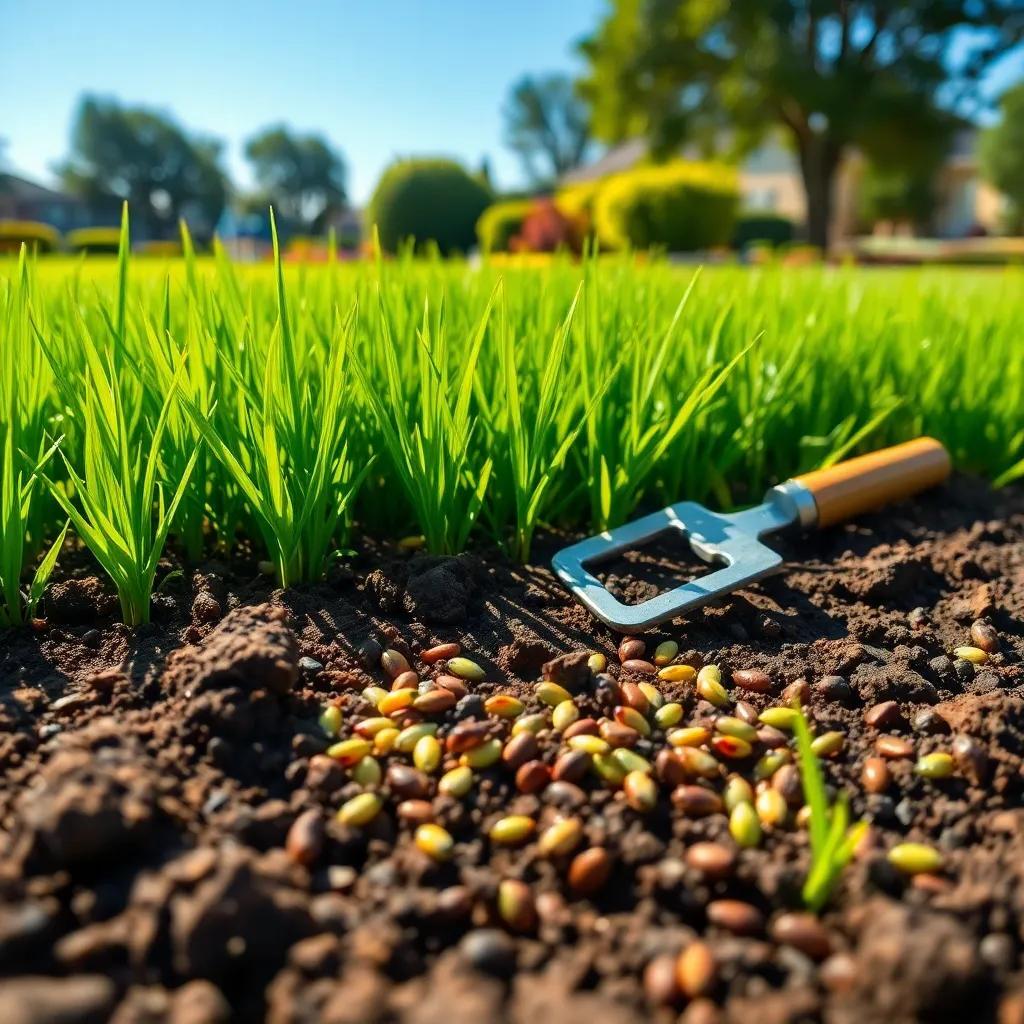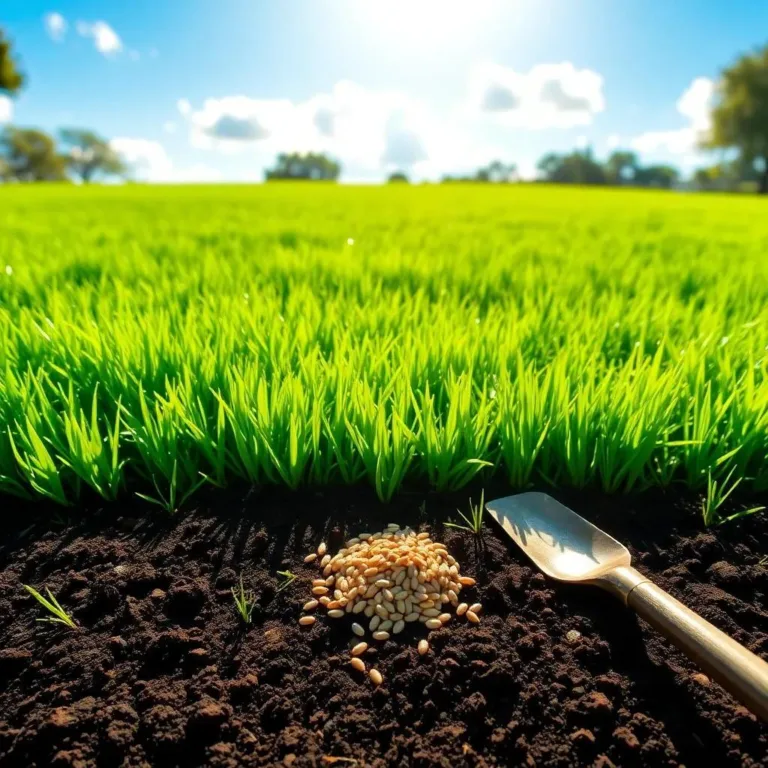Are you dreaming of a lush, green Bermuda grass lawn that makes your neighbors envious? I certainly am! Growing Bermuda grass from seed can be a fun and rewarding journey. In this article, I’ll guide you through everything you need to know, from germination to lush growth, so you can enjoy the perfect lawn in no time! Let’s dig in!
Factors Influencing Bermuda Grass Seed Growth
When it comes to growing Bermuda grass, several factors can really make a difference. Think of it like baking a cake: if you miss one ingredient or bake it at the wrong temperature, you might end up with a flop! So, let’s look at some key elements that affect how well your Bermuda grass will grow.
- Temperature: Bermuda grass loves warmth! It needs a minimum soil temperature of about 65°F (18°C) to sprout. For the best results, aim for temperatures between 75°F and 85°F (24°C and 29°C). It’s like putting that cake in a warm oven; it helps it rise!
- Soil Quality: Just like a cake needs good ingredients, your Bermuda grass needs healthy soil. Make sure the soil is well-draining so that water doesn’t hang around too long, causing root rot. Plus, it should be rich in organic matter to give the grass a nutrient boost!
- Watering Wisely: Keeping the soil moist during the germination stage is key. Think of it as keeping the cake batter just right—too much water can drown the seeds, while too little can lead to dryness. I recommend watering lightly but frequently.
- Sunlight: Bermuda grass is a sun-seeker! It craves at least 6 to 8 hours of sunlight every day. If it doesn’t get enough, it might just sit there looking sad. So, choose a bright spot in your yard!
- Seed Quality: Lastly, not all seeds are created equal. You want to pick high-quality, certified seeds from reliable sources. This way, you set yourself up for a fantastic lawn!
By paying attention to these factors, you can create a lovely environment for your Bermuda grass to flourish! So, let’s get those seeds growing, shall we?
Ideal Conditions for Planting Bermuda Grass Seed
Creating ideal conditions for your Bermuda grass seeds can feel a bit like preparing for a fun picnic. You want everything just right to ensure a great experience! Here are some important tips to help your grass seeds thrive:
- Soil Preparation: Before planting, get your soil ready! Start by removing any pesky weeds, rocks, or debris. I like to use a rake or tiller to make the soil nice and loose, like fluffy cake batter, ready to hold those seeds!
- Soil pH: Bermuda grass likes its soil pH to be between 6.0 and 7.5. You can test this with a simple soil testing kit. If it’s too acidic, adding lime can help; if it’s too alkaline, a little sulfur will do wonders!
- Seed Depth: When planting the seeds, keep them shallow! Aim for 1/4 inch to 1/2 inch (0.6 cm to 1.3 cm) deep. Too deep, and they may struggle to reach the surface. Too shallow, and they could dry out!
- Watering: Right after planting, give your seeds a thorough watering. Keep that soil consistently moist, but don’t let it drown! Gradually cut back on watering as the grass establishes, but give it plenty of love.
- Maintenance: Once your seeds have sprouted and reached about 2 to 3 inches (5 to 7.6 cm) in height, it’s time to mow! Set your mower to keep the grass at around 1 to 1.5 inches (2.5 to 3.8 cm) for optimal growth.
By following these steps, you’ll create the perfect conditions for your Bermuda grass seeds to thrive. Just think of the lush, green lawn you’ll be enjoying before you know it! Happy planting!

Understanding the Germination Period of Bermuda Grass Seed
When I think about growing Bermuda grass, the germination period gets me excited! This is the time when those tiny seeds come to life and start sprouting into beautiful green grass. Typically, Bermuda grass seed takes about 7 to 14 days to germinate, depending on a few key factors.
Here’s what you should remember:
- Temperature: Like a warm hug, Bermuda grass seeds love warmth! They need soil temperatures around 65°F (18°C) to germinate, but warmer is even better. If you can keep it between 75°F and 85°F (24°C and 29°C), you’ll speed up that sprouting process for sure!
- Moisture: Think of seeds like little sponges—they need consistent moisture to grow. Keep the soil moist, but not soggy! I recommend watering lightly a few times a day, especially during the germination period. This keeps those seeds happy and thriving!
- Seed Quality: The quality of the seeds plays a huge role in how quickly they germinate. Choose certified seeds from reputable brands to maximize germination rates. Trust me, it makes a big difference!
- Watch for Growth: As the days pass, don’t forget to check for those tiny green shoots poking through the soil. It’s exciting to see them emerge! Protect them from foot traffic and disturbances during this delicate phase.
So there you have it! Give your Bermuda grass seeds the right conditions, and watch them grow into a lush lawn. Isn’t gardening just the best?
Growth Stages of Bermuda Grass Seed Explained
Once your Bermuda grass has sprouted, it goes through some exciting growth stages! Understanding these stages helps me take better care of my lawn. Let’s break it down!
- Seedling Stage: This is the first stage after germination when the seedlings are delicate and tender. At this point, they have one or two sets of leaves. It’s so cute watching them pop up! During this time, keep the soil moist and protect these little guys from foot traffic and pests.
- Establishment Stage: As the seedlings grow stronger, they enter the establishment stage. This is when they develop a more robust root system and start spreading out. You’ll notice your lawn filling in nicely. Regular watering and mowing will help it grow thicker and healthier. I like to mow when the grass reaches about 2 to 3 inches (5 to 7.6 cm)!
- Maturation Stage: Finally, we reach the maturation stage. The grass becomes thick and hearty, capable of withstanding foot traffic like a champ! At this point, you’ll want to maintain a regular mowing schedule and keep an eye on watering and fertilization. It’s a great time to show off your beautiful lawn!
Understanding these growth stages will help you provide the care needed to keep your Bermuda grass thriving. Just like any good relationship, a little attention goes a long way!
Tips for Ensuring Healthy Bermuda Grass Growth
Now that you’re on your way to growing a fabulous lawn, let’s talk about some tips for ensuring healthy Bermuda grass growth! With a little extra care, you can achieve the grass of your dreams.
- Choose Quality Seed: Start with high-quality Bermuda grass seed suited for your climate. This makes all the difference in how well your grass grows!
- Proper Soil Preparation: Make sure the soil is well-prepared before planting. Remove any debris and loosen the soil. I like to mix in organic matter to boost fertility!
- Consistent Watering: Watering is key! Keep the soil consistently moist during the germination phase. Once established, the grass needs deep, less frequent watering. This encourages strong root growth.
- Mow at the Right Height: Once your grass reaches about 2 to 3 inches (5 to 7.6 cm), it’s time to mow. Set your mower to keep the grass at around 1 to 1.5 inches (2.5 to 3.8 cm). This helps it look neat and encourages thick growth!
- Regular Fertilization: Use a balanced fertilizer specifically designed for Bermuda grass. Follow the instructions carefully to avoid over- or under-fertilizing. Your grass will appreciate the nutrients!
- Control Weeds: Weeds can steal resources from your grass. Implement a plan for controlling weeds early on, so your Bermuda grass can thrive without competition!
By following these tips, I believe you’ll enjoy a lush, green lawn that you can be proud of. Happy growing!

